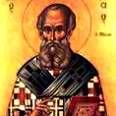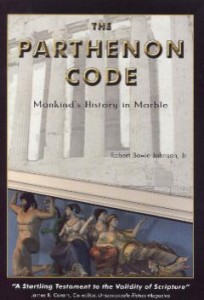by St. Athenagoras of Athens
 A Plea For Chrisitans was written by Athenagoras (c. 176 A.D.) to the Emperors Marcus Aurelius and his son Commodus as a philosophical appeal for justice on behalf of the Christians. In this work, Athenagoras endeavors to show the emperors that the ill-treatment of the Christians is entirely unreasonable. This is the first philosophical demonstration of the unity of God in Christian literature. He also sets forth the doctrine of the Trinity.
A Plea For Chrisitans was written by Athenagoras (c. 176 A.D.) to the Emperors Marcus Aurelius and his son Commodus as a philosophical appeal for justice on behalf of the Christians. In this work, Athenagoras endeavors to show the emperors that the ill-treatment of the Christians is entirely unreasonable. This is the first philosophical demonstration of the unity of God in Christian literature. He also sets forth the doctrine of the Trinity.
 The reason for excerpting these chapters is the remarkable claim, and proofs, which are very similar to Robert Bowie Johnson’s thesis in The Parthenon Code: Mankind’s History in Marble. Johnson’s reasoning and conclusions are compelling, and I find that Athenagoras has already laid the clear groundwork for the very same idea: The pagan gods are simply the deified men and women of the past. Johnson goes further, stating that they are, in fact, the Biblical characters of Genesis, but from the point of view of those who reject God and His Laws, and would make themselves “like God.” I don’t get anything for recommending The Parthenon Code, but I do suggest you read it.
The reason for excerpting these chapters is the remarkable claim, and proofs, which are very similar to Robert Bowie Johnson’s thesis in The Parthenon Code: Mankind’s History in Marble. Johnson’s reasoning and conclusions are compelling, and I find that Athenagoras has already laid the clear groundwork for the very same idea: The pagan gods are simply the deified men and women of the past. Johnson goes further, stating that they are, in fact, the Biblical characters of Genesis, but from the point of view of those who reject God and His Laws, and would make themselves “like God.” I don’t get anything for recommending The Parthenon Code, but I do suggest you read it.
REASONS WHY DIVINITY HAS BEEN ASCRIBED TO MEN
For if detestable and god-hated men had the reputation of being gods, and the daughter of Derceto, Semiramis, a lascivious and blood-stained woman, was esteemed a Syria goddess; and if, on account of Derceto, the Syrians worship doves and Semiramis (for, a thing impossible, a woman was changed into a dove: the story is in Ctesias), what wonder if some should be called gods by their people on the ground of their rule and sovereignty (the Sibyl, of whom Plato also makes mention, says:—
“It was the generation then the tenth,
Of men endow’d with speech, since forth the flood
Had burst upon the men of former times,
And Kronos, Japetus, and Titan reigned,
Whom men, of Ouranos and Gaia
Proclaimed the noblest sons, and named them so,
Because of men endowed with gift of speech
They were the first”);
and others for their strength, as Heracles and Perseus; and others for their art, as Asclepius?
Those, therefore, to whom either the subjects gave honour or the rulers themselves[assumed it], obtained the name, some from fear, others from revenge. Thus Antinous, through the benevolence of your ancestors towards their subjects, came to be regarded as a god. But those who came after adopted the worship without examination.
“The Cretans always lie; for they, O king,
Have built a tomb to thee who art not dead.”
Though you believe, O Callimachus, in the nativity of Zeus, you do not believe in his sepulchre; and whilst you think to obscure the truth, you in fact proclaim him dead, even to those who are ignorant; and if you see the cave, you call to mind the childbirth of Rhea; but when you see the coffin, you throw a shadow over his death, not considering that the unbegotten God alone is eternal.
For either the tales told by the multitude and the poets about the gods are unworthy of credit, and the reverence shown them is superfluous (for those do not exist, the tales concerning whom are untrue); or if the births, the amours, the murders, the thefts, the castrations, the thunderbolts, are true, they no longer exist, having ceased to be since they were born, having previously had no being. And on what principle must we believe some things and disbelieve others, when the poets have written their stories in order to gain greater veneration for them?
For surely those through whom they have got to be considered gods, and who have striven to represent their deeds as worthy of reverence, cannot have invented their sufferings. That, therefore, we are not atheists, acknowledging as we do God the Maker of this universe and His Logos, has been proved according to my ability, if not according to the importance of the subject.
